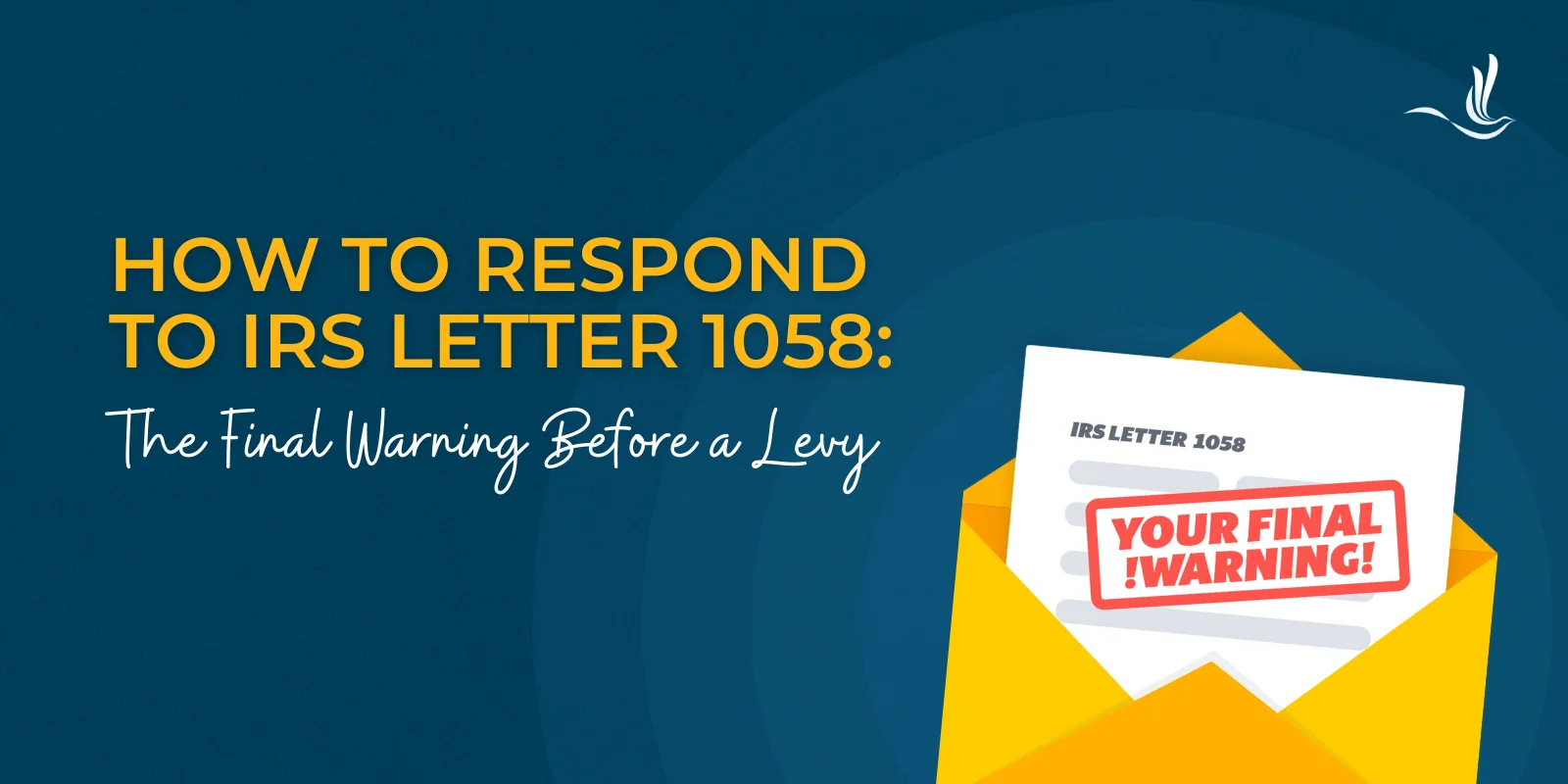Key Takeaways:
IRS Letter 1058 is a final warning: It signals the IRS’s intent to levy your assets, including wages, bank accounts, and property, if no action is taken within 30 days.
It follows a series of prior notices: CP14, CP501, CP502, CP503, and CP504 precede Letter 1058, ensuring it’s never sent without prior warnings.
You have important rights: Taxpayers can request a Collection Due Process (CDP) hearing, appeal decisions to the U.S. Tax Court, or pursue Innocent Spouse Relief if applicable.
Immediate responses prevent severe consequences: Options include paying the full balance, setting up an installment plan, submitting an Offer in Compromise, or requesting Currently Not Collectible status.
Strict 30-day deadline: Missing the deadline allows the IRS to levy assets immediately; extensions are rare and only granted in extraordinary circumstances.
Prevent future issues: Timely tax payments, accurate withholding, organized recordkeeping, and professional tax guidance help avoid future IRS collection actions.
Receiving a notice from the IRS can be overwhelming, but some letters demand immediate attention. IRS Letter 1058, formally known as the Final Notice of Intent to Levy and Notice of Your Right to a Hearing, is one of the most urgent communications you can receive. It signals that the IRS is prepared to take direct collection action, such as garnishing wages, freezing bank accounts, or seizing property, unless you respond promptly. Understanding what this letter entails, your rights, and how to respond effectively can prevent severe financial consequences. This guide breaks down the letter in detail, explores your options, and provides actionable steps to protect yourself.
What Is IRS Letter 1058?
If you’ve received IRS Letter 1058, it’s crucial to understand its purpose and implications. IRS Letter 1058 is a final notice sent to taxpayers with unpaid taxes who have ignored previous collection notices. It communicates that the IRS intends to levy your assets if no action is taken within 30 days. In many cases, taxpayers only become aware of the severity of their situation when they receive this letter, making timely action critical.
Key Features of IRS Letter 1058
The letter typically includes:
The total balance owed, including taxes, penalties, and accrued interest.
A 30-day window to respond before the IRS may levy your property.
Instructions on how to request a Collection Due Process (CDP) hearing.
Contact information for IRS departments if you wish to discuss payment or dispute your balance.
Let’s look at a typical scenario of a taxpayer receiving IRS Letter 1058. Emily owes $10,000 in unpaid taxes for 2022 and receives IRS Letter 1058 on September 1. The IRS can begin garnishing her wages or levying her bank accounts after October 1 if she takes no action. Understanding the urgency of this notice is key. Failure to respond can result in immediate collection actions, and the options for resolving the debt narrow significantly after the 30-day window.
Letter 1058 vs. LT11: Are They the Same?
Many taxpayers are confused because the IRS also issues an LT11 notice. While the names differ, their purpose and legal weight are essentially the same. Letter 1058 and LT11 both serve as the IRS’s final warning before levy action. The difference lies mainly in the department issuing the notice:
Letter 1058: Typically sent from the IRS automated collection system.
LT11: Often a shorter version and sent directly by a revenue officer or centralized collection department.
Despite these differences, your obligations remain the same: you have a 30-day window to respond, request a hearing, or take other collection prevention actions. Ignoring either notice will result in identical consequences, including potential wage garnishment, bank account levy, or property seizure.
Why Did You Receive IRS Letter 1058?
IRS Letter 1058 is issued to taxpayers who have failed to address prior IRS notices. Typical reasons include:
Unpaid income taxes from one or more tax years.
Accumulated penalties and interest due to late filing or payments.
Ignoring prior IRS notices, such as CP501, CP504, or similar collection notices.
Termination or default of a previous installment agreement.
For example, let’s say Jane received a CP504 notice in March detailing a $5,000 tax debt. She did not respond or attempt to make payments. In June, the IRS sent Letter 1058, warning her of the impending levy. The IRS uses these notices to ensure taxpayers are aware of their obligations before taking more aggressive action. While receiving Letter 1058 does not automatically mean severe financial trouble, it does indicate that your window to resolve the issue is closing quickly.
The Final IRS Notice in a Sequence
Before you receive IRS Letter 1058, the IRS typically sends a series of prior notices to alert you of unpaid taxes. These notices include:
CP14 – Initial notice of unpaid taxes
CP501 – First reminder notice
CP502 – Second request for payment
CP503 – Third reminder notice
CP504 – Notice of Intent to Levy (may seize state tax refunds)
This sequence ensures that Letter 1058 is never sent out of the blue. It represents the final warning before the IRS can legally begin seizing assets.
What Happens After You Receive IRS Letter 1058?
Once you receive Letter 1058, the IRS sets a 30-day period during which you can act to prevent collection actions. Understanding this timeline is crucial to protecting your finances.
The 30-Day Response Window
During the 30-day period, taxpayers can:
Pay the balance in full.
Request an installment agreement.
Submit an Offer in Compromise.
Request Currently Not Collectible status.
File for a Collection Due Process (CDP) hearing.
IRS Actions After the 30-Day Window
If you do not respond within 30 days from the date of the letter, the IRS can levy a wide range of assets, including:
Personal assets, such as cars or homes
For taxpayers with debts over $50,000, failure to address the letter can even result in passport revocation. On day 31, the IRS gains legal authority to begin seizing your assets. While you may still request an “equivalent hearing” within one year, it won’t stop collection actions that have already begun.
Additionally, extensions to respond are rarely granted and are reserved for extraordinary circumstances, such as military service in a combat zone, serious illness, or natural disasters. Always send hearing requests via certified mail with return receipt requested to ensure proof of timely filing.
Your Rights Under IRS Letter 1058
Receiving a final notice does not mean the IRS has unlimited authority. Taxpayers retain significant rights, which can be leveraged to prevent or minimize collection actions.
Right to a Collection Due Process (CDP) Hearing
A CDP hearing allows taxpayers to dispute the levy or propose alternative collection arrangements. Filing Form 12153 initiates this process. During the review:
The IRS cannot levy your assets.
You can raise issues such as errors in your tax assessment or financial hardship.
You may propose alternatives like installment plans, Offers in Compromise, or Currently Not Collectible status.
Appeal Rights
During a CDP hearing, taxpayers may:
Challenge the amount owed or IRS calculation errors.
Request alternative collection methods based on financial hardship.
Ensure due process is followed before any levy occurs.
For instance, Maria owed $12,000 and received IRS Letter 1058. She submitted Form 12153 within 25 days, pausing all collection actions while negotiating a manageable payment plan with the IRS. Understanding these rights is crucial to prevent the IRS from acting prematurely or unfairly. If you disagree with the outcome of a CDP hearing, you can appeal to the U.S. Tax Court for judicial review, which serves as an important safeguard against improper collection actions.
Innocent Spouse Relief
For married couples, not all tax liabilities are automatically shared. If the tax debt primarily belongs to your spouse, Innocent Spouse Relief may protect you from responsibility for the debt. This relief is particularly relevant if:
You did not know about errors or underreporting on the joint tax return
You did not benefit from the unpaid taxes
You can demonstrate that taking responsibility would be unfair
For example, let’s say Jane and Mark filed a joint return. Mark failed to report certain income, which resulted in a $10,000 tax debt. Jane qualifies for Innocent Spouse Relief if she had no knowledge of the underreported income and did not benefit from the additional funds. To request Innocent Spouse Relief, file Form 8857 with the IRS and provide supporting documentation demonstrating your eligibility. Approval can protect your personal assets from IRS collection actions, including wage garnishment, joint bank account levies, or property seizures.
How to Respond to IRS Letter 1058
Immediate action is critical after receiving Letter 1058. Here are the main options, with detailed explanations and examples:
Pay the Balance in Full
Paying the full balance is the fastest and most straightforward way to stop collection actions. Payments can be made:
Online via IRS Direct Pay or EFTPS
By check or money order sent to the IRS
By credit card (note processing fees may apply)
So, if your notice shows a $7,200 balance, paying it immediately removes the levy threat and stops interest from accruing.
Set Up a Payment Plan (Installment Agreement)
If paying in full is not feasible, an installment agreement allows monthly payments to resolve your tax debt. Options include:
Short-term agreements: Up to 120 days, generally interest accrues but no setup fees.
Long-term agreements: Over 120 days, may include setup fees but prevents levy action while the plan is active.
For example, David owes $15,000 and cannot pay in full. He sets up a monthly payment plan of $500. The IRS cannot levy his wages as long as he adheres to the agreement.
Submit an Offer in Compromise
An Offer in Compromise (OIC) allows eligible taxpayers to settle their debt for less than the full amount owed. The IRS evaluates:
Request Currently Not Collectible (CNC) Status
CNC status temporarily suspends collection actions if you cannot pay anything. Interest and penalties continue to accrue, but the IRS will not levy your assets. For instance, Mark lost his job and has no income. By requesting CNC status, the IRS agrees not to levy his bank accounts while he seeks employment.
Request a Collection Due Process (CDP) Hearing
Filing Form 12153 initiates a CDP hearing, providing an opportunity to dispute the levy or propose alternative arrangements. Include documentation of income, expenses, and IRS errors to strengthen your case. Once you’ve submitted a CDP hearing request, your case will be assigned to a Settlement Officer from the IRS Independent Office of Appeals. The officer will schedule your hearing and review your case.
Before the hearing:
Complete financial disclosure forms
Gather documentation of income, expenses, and assets
Prepare a clear resolution proposal
Organize any evidence challenging the IRS’s liability or procedures
During the hearing:
Present your case clearly and factually
Respond to officer questions and provide requested documentation
After the hearing:
You’ll receive a determination letter outlining the officer’s decision
If accepted, follow all requirements meticulously
If rejected, you generally have 30 days to file a petition with the U.S. Tax Court
Maintain detailed records of all communications and documents throughout this process, as they serve as proof of your compliance and proactive efforts.
Common Mistakes When Responding to IRS Letter 1058
To avoid compounding problems, taxpayers should avoid these common mistakes:
Ignoring the letter: This forfeits appeal rights and accelerates levy actions.
Missing the 30-day deadline: Delay may prevent access to CDP hearings.
Incomplete or inaccurate forms: Errors on Form 12153 or other filings can lead to delays or denial.
Assuming IRS will not act quickly: The IRS can levy without further notice once deadlines pass.
Relying on verbal promises: Always get written confirmation of any agreements with the IRS.
Preventing Future Collection Actions
Once you’ve resolved your immediate IRS Letter 1058 situation, taking preventive measures can help you avoid future collection problems:
W-2 employees: Review withholding with the IRS Tax Withholding Estimator and adjust W-4 forms as needed
Self-employed individuals: Set up a system for quarterly estimated tax payments via the Electronic Federal Tax Payment System
Business owners: Keep business and personal finances separate; use payroll services for automatic tax deposits
Be sure to address any IRS notices promptly as delaying action can escalate minor issues into major collection actions. These steps help keep your finances organized and reduce the likelihood of future IRS levy notices.
When to Seek Professional Help
Although some taxpayers can handle Letter 1058 on their own, professional help is often warranted in these cases:
Large balances or multiple years of unpaid taxes
Disputes over the amount owed or collection procedures
Complex financial situations requiring an Offer in Compromise
Imminent levy or property seizure
Tax professionals, such as enrolled agents, CPAs, or tax attorneys, can negotiate with the IRS, file the proper forms, and protect your rights. Professional guidance often prevents mistakes that could exacerbate your financial situation.
FAQs: IRS Letter 1058 and IRS Levies
How do I respond to an IRS notice of levy?
To respond, act immediately by paying the balance in full, setting up an installment agreement, submitting an Offer in Compromise, or requesting a Collection Due Process (CDP) hearing using Form 12153. Responding within the 30-day window on IRS Letter 1058 can prevent the IRS from seizing your assets.
How do I appeal a notice of intent to levy?
You can appeal by filing a CDP hearing request with Form 12153. This pauses levy actions while the IRS reviews your case, and you can later appeal the determination to the U.S. Tax Court if necessary.
How to negotiate a levy?
Negotiation typically involves contacting the IRS to propose an alternative resolution, such as an installment plan, Offer in Compromise, or Currently Not Collectible status. Providing full financial disclosure increases the likelihood of avoiding immediate collection actions.
How many notices does the IRS send before a levy?
Before issuing IRS Letter 1058, the IRS generally sends a sequence of notices: CP14 (initial balance), CP501, CP502, CP503 (reminders), and CP504 (Notice of Intent to Levy). Letter 1058 is the final warning, giving taxpayers one last chance to respond.
Will an offer in compromise stop a levy?
Submitting an Offer in Compromise can prevent levy actions if the IRS accepts the offer or while it is under review. However, it does not automatically stop levies, so filing promptly and communicating with the IRS is essential.
Does the IRS have to notify you of a levy?
Yes. By law, the IRS must send a final notice, like IRS Letter 1058 or LT11, giving you at least 30 days to respond before initiating a levy. This ensures you have the opportunity to request a CDP hearing or other collection alternatives.
Can a bank levy take all your money?
A bank levy can seize funds in your account up to the amount of the unpaid tax, including penalties and interest. Some essential funds, such as Social Security or certain federal benefits, may be partially protected depending on exemptions and state laws.
Tax Help with IRS Letter 1058
Receiving IRS Letter 1058 is a serious warning that cannot be ignored. It is the IRS’s final notice before levy action, meaning immediate response is crucial. Understanding the letter, knowing your rights, and exploring available options, such as paying in full, setting up installment agreements, submitting an Offer in Compromise, requesting Currently Not Collectible status, or filing for a Collection Due Process hearing, can prevent severe financial consequences. Prompt, informed action, ideally with professional guidance, is the most effective way to protect your finances and resolve your tax obligations. Optima Tax Relief is the nation’s leading tax resolution firm with over a decade of experience helping taxpayers with tough tax situations.
If You Need Tax Help, Contact Us Today for a Free Consultation



























